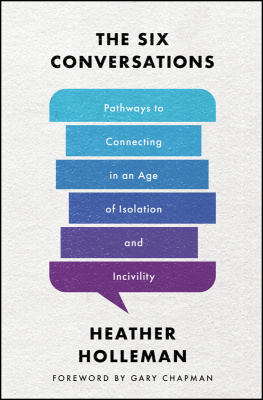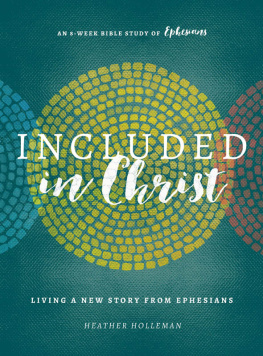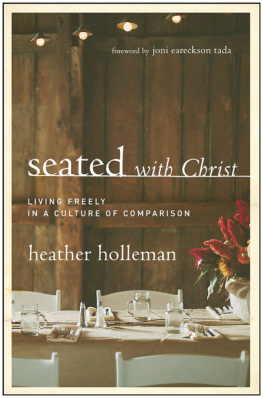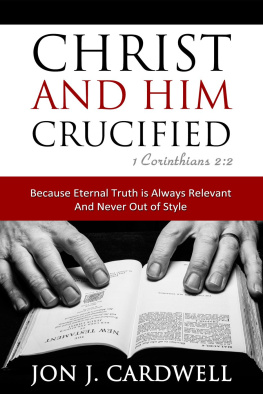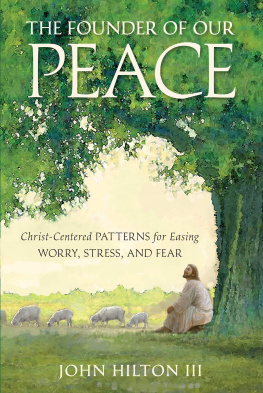Table of Contents
Pagebreaks of the print version
Guide
T hank you to those who continue to pray for my writing and who journey alongside me as friends and Living Stones who together rise up as a holy dwelling place for God. I thank all those at Moody Publishers whose encouragement, wisdom, and diligent work turn my writing on overlooked verbs into beautiful books and audio recordings for others to enjoy. Special thanks for Judy Dunagan, my acquiring editor, whose passion to make Gods Word come alive truly blesses the world; to Pam Pugh, the developmental editor who provided treasured insight and direction; to Rachel Heller, and the design team including Nathan Pernia and Erik Peterson for creating a stunning website and cover designs; to Kirsten Kamm, my publicist, for her wisdom, prayers, and direction; to Janis Backing who mentored me in the fine art of radio interviews and publicity along with Holly Kisly and Ashley Torres in marketing. Thank you to Adam Dalton for his encouragement and expertise. Thank you to the team at DC Jacobson who stuck with me. Special thanks to Mom and Dad for all their love and support. Thank you to Melissa Kish, who has always served as a guarding big sister and friend. Finally, thank you to Ashley, Sarah, and Kate who I place every day in the fortress of Gods great guarding care.

T intern Abbey, built in 1131, rests on the River Wye near Chepstow, Wales. As a site of national importance and pilgrimage, the abbey once thrived as a prosperous destination for those seeking the religious life. The poet William Wordsworth wrote about this abbey in Lines Composed a Few Miles above Tintern Abbey, July 13, 1798 because the memory of the abbey brought tranquil restoration to his soul and a sublime sense of something much larger than himself. Like the towers and fortresses King David called to mind to remember Gods guarding care, Tintern Abbey stands today as a marvelous image of worship, peace, and refuge.
* * *
.
Thank you,
The Moody Publishers Team
CHAPTER 1

SOMETHING MISSING
I ache for something I cannot name.
LAUREN SLATER, American psychologist
I was thirty-seven years old when I discovered a vital truth about Jesus.
A lightning bolt of realization hit me on a summer day in late July as I wondered over the phrase in Ephesians 2:6 that God raised us up with Christ and seated us with him in the heavenly realms in Christ Jesus. I closed my eyes and began to think about my life.
I knew Jesus. I loved Jesus. I worshiped and served Him. I read my Bible, studied Christian concepts, kept a detailed prayer journal, shared my faith, met regularly with other Christians in church and in small group Bible studies, and worked for my community in various ways. I was the mom listening to Christian music in the kitchen, teaching Bible verses to my children, and rejoicing over what a great God I served. I loved my husband and our two beautiful elementary schoolaged children. I blogged daily and wrote novels. Life often felt full and blessed.
But something was missing.
I did not know how to name it. Underneath the activity of my life ran a dark undercurrent of sin. I felt a subtle corrosion that something did not ring true about me. Something false, inauthentic, and impure governed my life. I felt like everything I didall the activity, the writing, serving, speaking, studyingwas about something other than Jesus. My life was more about me than Him. I was missing a theological truth that kept me in a prison of self-absorption.
I wanted importance and recognition.
I wanted love.
I wanted something.
When I read Ephesians 2:6, I thought about the word seated. I kept repeating, Im seated with Christ. I imagined the security and sense of belonging that came with having a seat at the most important table in the universe with other Christians. How would that seated person live? What would it feel like to have a special place at Gods royal table?
I was not living as one who had a seat at the table.
I lived as one fighting for a seat at the table.
It was as if God said to me, Heather, you can stop fighting so hard. You already have a seat at the table. You are already there. Everything you want for yourself is already true about you in Christ. Now start living like a seated person.

Like me, many Christians miss this essential truth. We are missing a piece of a theological puzzle. We grasp that we are justified, forgiven, saved, sanctified, and redeemed. But seated? What does it mean? Why would the apostle Paul, in a historic moment when the church in Ephesus needed a precise understanding of the gospel, use this image and this verb instead of another?
I have spent decades trying to build up a theological vocabulary to understand who Jesus is and who I am in relation to Him. In all the years of learning in church settings and Christian communities, I never heard the word seated to tell me who I was.
Have you? Why have we missed this incredible word in Scripture? What I needed desperately to understand was this: Im seated. I have a place at the greatest table the world has ever known. I belong. Im in my seat, and Im responding to specific instructions from the Lord about the good works, which God prepared in advance for me to do as promised at the end of Ephesians 2. The words in Ephesians 2:6 constitute a profound message of inclusion, identity, and calling.
Before that summer afternoon when I encountered Jesus afresh in the words of that letter to the Ephesians, I had served in vocational ministry for fifteen years. I was well-read, apparently strong in my faith, and fruitful in ministry. I had even studied the psychology of emotion for five years for my doctorate in English literature and received theological and ministry training. But the dark corrosion persisted; I was still fighting hard for recognition and belonging. I knew something was wrong because I lived in shame on the one handtormented by failure, inferiority, and worthlessnessand narcissism on the otherexalting and promoting myself. I compared myself to others and felt either jealous or superior. I was consumed with evaluating myself in a sickened effort to prove my worth, find belonging, and receive acknowledgment from audiences both real and imagined.
What did this drive to earn my seat at the table produce? Poor boundaries, people-pleasing behaviors, constant self-evaluation, disconnection, fear of failure, self-doubt, controlling behaviors, overeating, a sense of entitlement, delusions of fame, shame, a lack of vulnerability, a judgmental and critical attitude, and an easily offended spirit. Despite ten years of managing these symptoms in therapeutic and spiritual settings, I never quite got to the root of my immature and narcissistic behaviors. I could theorize why I acted certain ways, but I could not articulate with any satisfaction how to change.
So I confessed more, prayed harder to be controlled by the Holy Spirit, and read bestselling Christian self-help books. It seemed, to the outsider, like I was healing. I was even asked to share all my wisdom with others in leadership seminars.
Ironically, it was the same summer afternoon I began writing a talk on emotional maturity for Christian leaders in ministry that Jesus intervened and led me to Ephesians 2. Instead of delivering a presentation to leaders on healthy boundaries and emotionally mature behaviors, I changed the speech to get at the core of what drives unhealthy behaviors.


